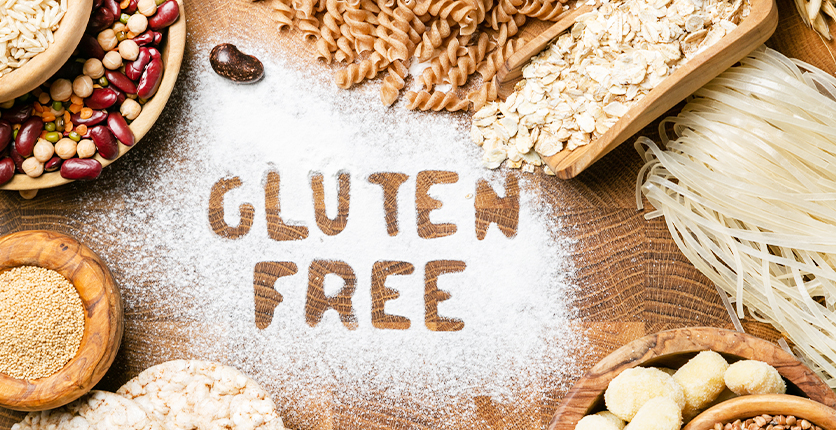Gluten refers to a group of proteins found in certain cereal grains like wheat, barley and rye. Going gluten-free seems to be all the rage these days, with more and more people eliminating gluten from their diet and supermarkets stocking more gluten-free products, such as pasta, crackers and bread made from rice, corn, buckwheat, lentil or chickpea flours instead of wheat.
But, is the gluten-free lifestyle for everyone or is it only recommended for people with specific gut conditions? And, if you have to eat gluten-free, what foods must you cut out and why?
Bridget Marr, a dietitian with a special interest in digestive health and the owner of Nutritional Solutions, answers some common questions about the gluten-free lifestyle.

Q: A gluten-free diet is usually recommended for people with celiac disease. What is celiac disease?
Bridget: This is a serious and well-defined autoimmune condition, where the body’s immune system attacks the body’s own tissues when gluten is eaten. The gluten protein in wheat, rye and barley is what triggers the immune reaction. This causes damage to the lining of the gut and hinders the body’s ability to properly absorb nutrients from food.
Symptoms include bloating, diarrhoea, nausea, wind, constipation, tiredness, mouth ulcers, sudden or unexpected weight loss (although not in all cases), anaemia, blistering skin rash, sub-fertility, and neurological problems. Celiac disease is a “multi-system” disorder. If you screen for celiac disease and test positive for it, your doctor may take a look at your gut lining. There is no medication to treat or cure celiac disease; the only treatment is a strict gluten-free diet for life.

Q: Is gluten sensitivity or intolerance the same as celiac disease?
Bridget: While the symptoms of gluten sensitivity are often similar to those of undiagnosed celiac disease, the two conditions are different. With gluten sensitivity, there does not appear to be any damage to the gut lining.
Currently, there’s no valid blood test for gluten intolerance or sensitivity, also known as non-celiac wheat sensitivity (NCWS). Plus, whether the gluten or some other component of wheat is actually responsible for the symptoms is still the subject of scientific debate. Recent studies in people with possible gluten sensitivity have shown that the gut symptoms may be due to fermentable carbohydrates (or FODMAPs) in wheat rather than gluten. Non-gluten proteins found in wheat are also being investigated as possible triggers.
If you suspect you’re gluten sensitive, it’s unclear how strict your gluten-free diet needs to be, whether the sensitivity is permanent and if there are any risks of complications. That’s why it’s important to consult a suitably qualified medical practitioner and dietitian to get an accurate diagnosis before making any major or long-term changes to your diet.

Q: What foods should I avoid if I want to cut out gluten?
Bridget: Avoid wheat, rye, barley and oats unless they’re gluten-free. This includes foods such as wheat or rye bread, roti prata, noodles like mee and ramen, bao, wontons, soy sauce, beer or lager, barley drinks, and cookies and crackers made from wheat flour.
Q: Can a gluten-free diet really help people who have trouble digesting gluten?
Bridget: Yes. In people with celiac disease, we’ve observed their gut lining become healthy again, and their body’s ability to absorb nutrients from food, improve.

Q: I suspect that wheat is making me bloated. Should I stop eating it completely?
Bridget: I’d first try to rely less on wheat and to mix up my starchy foods by choosing oats, rice, rice noodles, potatoes and corn. You could also try wheat or spelt sourdough as this contains less fermentable carbohydrates. Keep a food and symptom diary to see if you can pinpoint any possible triggers.

Q: Are there any health risks from following a gluten-free diet?
Bridget: A gluten-free diet can be perfectly well balanced, however, extra care and attention are needed because such a diet may be low in fibre and certain B vitamins. Furthermore, avoiding gluten is not easy and the diet can be restrictive and make eating out complicated.
I wouldn’t advise anyone who suffers from disordered eating or an eating disorder to introduce dietary restrictions unless medically necessary.
Note: Please consult your GP or physician before starting on a new diet plan.
Want more health articles like this, and other lifestyle content right in your inbox? Sign up for the eNSman Newsletter – you don’t need to be a SAFRA member to subscribe – and never miss another story!







